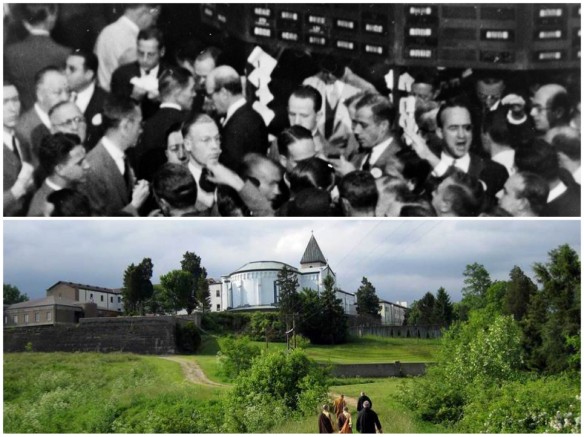
Above: Source; Below: Gethsemani, a Trappist Monastery in Kentucky, during the Catholic-Buddhist Dialogue. Photo by Rev. Heng Sure
[This is the beginning of a series of posts reflecting on how I found myself drawn to monasticism despite (or perhaps because of) my upbringing in the Bay Area and providing insight into how the relatively secular environment in which I grew up prompted me to look deeper into the meaning of life.]
Audio clip: Adobe Flash Player (version 9 or above) is required to play this audio clip. Download the latest version here. You also need to have JavaScript enabled in your browser.
Reading by Shramanera Chin Wei. Click the arrow on the audio player above for the audio. You can also download the recording.
One day in my high school Economics class the teacher showed us a video about a Trappist monastery, so as to give us a chance to see an “economic system” different from the one we were used to in suburban America. The Trappists didn’t live in a capitalistic or consumer framework. They based their lives on sufficiency and simplicity; in fact, they took a vow of poverty.
I realized that what the Trappist monks were saying was what my heart was saying to me.
Suddenly I had an epiphany–but not an epiphany relating to how another “economic system” worked. Rather, I realized that what the Trappist monks were saying was what my heart was saying to me. They were attempting to live a simple, humble life dedicated to God and in full accord with Biblical teachings. I was quite struck by that.
As early as middle school, I remember wondering about my purpose in life. But, in the hormones and emotions of adolescence, this search became dormant, only to reappear around junior year in high school. At that time, I began reflecting on what I was really doing with myself as the things that society put forth as worthwhile seemed rather meaningless.
However, while watching the video that day, something clicked inside. I thought, “Ah ha! That’s what I’m supposed to be, a monk!”
I told my mother, “Mom, you know what? I figured out what I’m supposed to do with my life!”
I went home that day quite excited that I had found my calling in life. I told my mother, “Mom, you know what? I figured out what I’m supposed to do with my life!”
Clearly seeing my excitement, my mom asked, “Oh, so what is it?”
“I think I’m supposed to be a monk,” I replied with a smile.
The next moment was quite unforgettable. The look on my mother’s face changed completely from a simple curiosity to a look of confusion and unhappiness. And there began six very tense years and about a decade where I rarely brought up the subject again.
